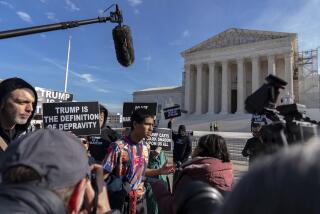Editorial: The Supreme Court shouldn’t reward government lies on the census citizenship question

Judging by the questions asked during oral arguments Tuesday morning, the Supreme Court’s conservative majority may be ready to back the Trump administration’s plan to add a citizenship question to the 2020 census, a move that would in all likelihood lead to an undercount in California and other high-immigrant states. Such a ruling would also wrongly reward the government by deferring to the executive branch’s decision-making despite clear bad faith and lies, and would fail to hold the government to its constitutional mandate to make as accurate a count as possible.
First, the lies: Commerce Secretary Wilbur Ross claimed that he added the citizenship question at the request of the Justice Department, ostensibly to collect data to help pursue voting rights cases — even though longtime voting rights advocates say sufficient data are already gathered from other sources, including the census’ annual American Community Survey. Later information, including internal Commerce Department emails, revealed that Ross had previously discussed the idea with former Trump advisor Stephen K. Bannon and immigration hard-liner Kris Kobach. And while the government claims it is merely reviving a question that had been asked on previous census forms, the question was last posed in the household census three generations ago, in 1950.
So what is the real reason the Trump administration wants the question added? It’s hard to see it as anything other than cynical partisan politics. Studies, including the Census Bureau’s own analysis, show that asking about citizenship status would likely dampen participation in immigrant communities already made skittish by the Trump administration’s rhetoric and policies. The undercount would lead to less legislative and congressional representation for immigrant communities (which tend to be in urban areas that support Democratic candidates) and would shift political power toward more homogeneous suburban and rural areas. It would also reduce federal funding to immigrant-heavy areas.
Enter the Fray: First takes on the news of the minute »
But the issue before the Supreme Court is more technical. Lower courts blocked the Commerce Department from adding the citizenship question, ruling that the stated reason was a pretext and that Ross had violated federal laws in doing so. The government argued that Ross’ reasons were irrelevant because federal law gives the Commerce secretary broad leeway to make such decisions. If the court’s conservative majority agrees, the justices would be signaling that they are willing to overlook blatant lies by the government and set the stage for further deference to agency decisions that could shift even more power to the executive branch. That’s unsettling ground, especially when the administration in office shows such disregard for the truth, for traditional norms of governance, and for the law itself.
Follow the Opinion section on Twitter @latimesopinion or Facebook
More to Read
A cure for the common opinion
Get thought-provoking perspectives with our weekly newsletter.
You may occasionally receive promotional content from the Los Angeles Times.






